#not canon but subtext examples are
Text
there are 4 categories of ships
1) canon
2)canon but didn’t end up together
3) not canon but subtext
5) interacted <2 times in canon
#canon examples are#nick and charlie#heartstopper#jake and amy#b99#canon but not together are#laurie and jo#little women#i can’t think of any others but they are there#not canon but subtext examples are#johnlock#destiel#or deancas#and interacted <2 times in canon are#mycroft x lestrade#and others that i also can’t think of
109 notes
·
View notes
Text
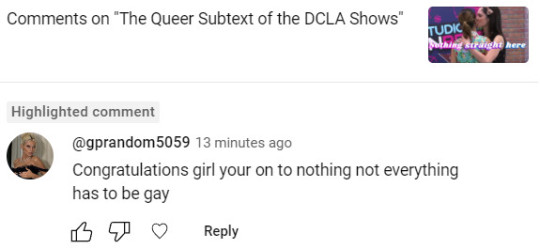
Someone did not watch the video at all and just commented for the sake of commenting thank you ig
Also they misspelled you’re
#violetta#soy luna#disney bia#i am literally within the first 2 minutes explaining how 'maybe the writers didn't always intend it but I see it anyway'#not to mention uh... the shows very much have queer subtext like LOOK AT THE ACTORS?#Facu wanting maxi to be gay for example?#also I've heard that they did intend for ana and mora to be canon#also the sitteo being skating partners?
10 notes
·
View notes
Text
I am once again thinking of how we never actually see the name that killed L, just his legal name in "Death Note: How to Read".
I'm thinking of Rem ripping out the pages in her death note she'd written on as she turns to dust, taking too the only written instance of name that killed the world's greatest detective, quite possibly as one last act of defiance against Light Yagami. Thinking of how if she hadn't, Light would have read the final name she'd written, kept inside him the knowledge that he's one of the only humans alive to keep the name that L felt was *his* at the day he died. Sure, he could've just attached hard to how he wanted to remember L, but it doesn't take away the fact that it feels as if he *doesn't* know L's name (because with all the focus he had on finding it out it doesn't erase the care he put into finding it)
I'm thinking of L, who's never really identified himself with a name. Not his legal name, given to him by his guardian, nor any of his number of aliases. He might as well have been L Lawliet just as much as he was the detective L, or Eraldo Coil, or Deneuve, or even his brief stint as Hideki Ryuga. He's been called so many names in his life, but doesn't identify with any of them. I'm thinking of the fact that Near and Mello clearly identify themselves as their legal names despite their similar use of aliases, the way that their legal names are explicitly the names needed to kill them. However, with L, we never see his legal name written down in the note nor do we get to see the name floating above his head. Unlike others from a similar background, we don't know the name that killed him, nor does he seem to identify with his legal name.
Of course, this brings up exactly what the name had killed him was, and if it simply was his legal name, why it wasn't just shown as with other characters. For someone who couldn't seem to form an attachment around any of the many names they've been called, I almost wonder if the name that killed him was something secret, played around with in his head, something only he (and someone with the eyes of course) would know.
#l lawliet#death note#A man can have so much trans subtext its unreal#By all means it would have made total sense for him to attach to his legal name‚ seeing that it was given to him by his longest living#guardian and was a substitute to him having none at all and yet#In some ways it almost brings into question how strained his relationship with Watari may have been‚ but also it reeks of subtext#Not identifying with your legal name or any name most people call you#That being said I am also uh lawlight trash so the monkeybrain also shoves all this thought aside and goes 'Okay but wouldn't it be funny#if the name that killed him was like Ryuzaki Yagami or some shit even though that probably doesn't make sense? The pain.'#Idk man I just think it says something that Light seems to never be allowed to know what name killed him‚ that it was never mentioned in#the source material (not even his legal)‚ and that other people from whammy's house in opposition to Light had their names needed to kill#them be their legal names/we get to see the names that killed them#I just be thinking#edit: I should also specify that some of this is canon interpretation while some is like shaping headcanon (for example it's not as if we#*see* Rem tear out any pages or anything but that's just me coming up with a reason as to why he wouldn't have just known L's name after#picking up her note and opening it for the first time)
69 notes
·
View notes
Text
zukka is kinda wild to me a little bit just bc like. atla has been ever for so *so* much longer than cs and yet a ship for it w minimal amnts of actual canon subtext outside one episode regularly takes up an insane amnt of my dashboard meanwhile carulia has like. the level of overt romantic subtext as a if a hypothetical different show had a relationship intended to be made officially romantic in the last season of a show only for that season to get botched somewhat due to quarantine and yet im the only one making content for it even semi regularly
#TO CLARIFY. I TIHNK ZUKKA IS GOOD AND CUTE AND FINE AND IK THIS IS IN PART BC THE ATLA FANDOM IS BIGGER#im jsut using zukka as an example yk#esp bc i remeber ppl arguing over shit like 'the red roses isnt romantic >:(( its just carmens colour !!'#and its jsut insane to me bc like. iv seen ppl be anti zukka somewhat but never anyone argue its bc of a lack of subtext#and its jsut inanse bc i see huge long posts on the dynamic of zukka and im like. babygirl where are u getting that from other than boiling#rock#meaningwhile iv seen like 3 semi long posts on the carulia dynamic evne when ppl see that theyre gay they dont wanna put in the work#to see shit thats write in front of them in regards to theure dynamic or at least talk abt it#AGAIN THIS HAS NOTHING TO DO W ZUKKA PERSONALLY IM V GLAD FOR EVERYONE MAKING POSTS LIKE THAT GO ZUKKA SHIPPER GO !!!!!!!!!!#im just using it as an example#actually i feel like i get this from luce saying to me 'like i thought carulia wld be like zukka like its the popular gay ship#but it doesnt have a lot in canon subtext but it isnt its actually like. insanly obvious'#(<- IM PARAPHRASING IF UR A MAD ZUKKA SHIPPER PLS DIRECT UR HATE TOWARDS ME NOT THEM PLEASEEE TY)#but also a lot of it is more just like. how fandoms treat mlm ships vs wlw ships.but idk maybe im justt being dumb#(ALSO THE LAYWERS OF @CARULIAA.ORG WOULD LIKE TO CALRIFY THAT THEY DO INFACT BELEIVE THAT ZUKKA HAS SOME CANON ROMANTIC SUBTEXT#MOSTLY WITHIN THE EPISODE 'THE BOILLING ROCK' BUT THAT THEY ARE HAPPY AND GLAD FOR ANYONE WHO FINDS ANY BOTH WITHIN AND OUTSIDE THAT EPISOD#AND THAT ONCE AGAIN THEY ARE SIMPLY USING ZUKKA MORE AS AN EXAMPLE)#(thats a joke i dont have laywers. obvs. but its kinda funny)#but also what do i know iv never even read the the prince and the fool thingy FGHDFHDFHDF#anyway. i just realised idk if tumblr still puts post in a tag if u mention them within ur tags. if so im like DEAD#oh well#tbh i more want my zukka mutuals to know i love their zukka posting !!! keep at it im just using u as an example while studying fandom stuf#also ik the lack of carulia content thing is kinda my fault but also at least im trying to make more !!! no one else is is the tihng#but i Am i have an amv in the works rn !!!!! and a fic in my brain#also the big group animatic kinda uh. forgot abt that ig other ppl are also working on carulia stuff. sorry#<//3#anyway it soo late. been listieng to our love is god on loop did u kno tht jd just killed kurt and ram omg dont do that !!!!!!#flappy rambles
11 notes
·
View notes
Text
I LOVE seeing different media's interpretations of Sherlock Holmes characters. Sometimes I wish everything was required to have a Sherlockian mystery episode and then I also wish I had endless time to watch, read, or listen to all of these (just the Sherlock Holmes fiction that currently exists is too much for one person). Like, everyone's Holmes is approximately the same in appearance (because Watson spends so much time describing him in the original books (gay gay homosexual gay)) but everyone has wildly different takes on his personality. The things that seem most consistent (other than the basic love for mysteries, intelligence, etc) is that he's coded as either autistic, aspd, or both (always some sort of neurodivergence), and that he is either gay, asexual, or both (very occasionally we see a comp-het Holmes, this is more common in older media). Things like whether he is more energetic and chaotic or more reserved and mature vary to an incredible degree. You could make a case for either based on the original books. Similarly, about how strict his morals are, or whether he is more driven by curiosity/interest, and the layers of these things, which is the mask and which is the countermask. Watson is almost always the same in personality but frequently varies in appearance (because a lot of writers are trying to make him hotter lmao. this one I'm watching has him about the same but bishounen-ified and Shaved bc I guess the mustache is unsightly??). Lestrade and Mrs. Hudson are absolute gambles. Everyone has a different take. And Moriarty? Every detail from his background to his philosophy is a rich hunting ground for imaginative interpretations. I love it. I love seeing what everyone thinks of them.
#the adventures of sherlock holmes#sherlock holmes#i wrote a lot more about Holmes here but that's because he's easier to hold up and analyze as an example#bc we already have the baseline of Watson spending a great deal of time thinking about him in every interpretation#i'm definitely not in it just for the ship but it is kind of funny that no matter what Else you do with the stories#johnlock subtext will sneak in bc of the very nature of it usually being told from Watson's perspective and how he canonically thinks about#Holmes#that time he spends an entire paragraph describing the grace of his hands my beloved
6 notes
·
View notes
Text
A quick guide to animal symbolism:
Animals have a long history of symbolism that varies between cultures and customs. As literary tropes develop, some animal symbolism has become universally recognised in the western literary canon. Here are some examples you can use in your writing to give subtext, develop motifs, or promote your thematic content.
🐥 Birds: freedom, hope, escape
🦁 Lions: strength, courage, royalty
🐶 Dogs: loyalty, devotion, protection
🐱 Cats: independence, stealth, mystery
🐺 Wolves: intelligence, nature, wildness
🦊 Foxes: cleverness, cunning, deception
🐍 Snakes: temptation, evil, deceit
🦋 Butterflies: transformation, change, new beginnings
🦉 Owls: wisdom, knowledge, mystery
🦅 Eagles: strength, freedom, nobility
◾ Ravens: death, mystery, the unknown
🕊️ Doves: peace, love, purity
🐻 Bears: resurrection, strength, power, new life
🤘 Bulls: virility, sovereignty, wealth
#animal symbolism#writer#writers#creative writing#writing#symbolism in writing#writing community#writers of tumblr#creative writers#writing inspiration#writeblr#writerblr#writing tips#writblr#writers corner#writers community#poets and writers#writing advice#writing resources#writers on tumblr#writers and poets#helping writers#writing help#writing tips and tricks#how to write#writing life#let's write#resources for writers#references for writers
3K notes
·
View notes
Text
tiny tag drop
☩ ❝Feet in the water & our heads in outer space❞ ( UDYATI. )
𝐕. chase the sky into the ocean ( FANTASY )
#☩ ❝Feet in the water & our heads in outer space❞ ( UDYATI. )#𝐕. chase the sky into the ocean ( FANTASY )#he's already in a fantasy genre that's just my like. u know Fantasy™ with prophecies and princesses and dragons (oh my)#god every example i was trying to list was literally like. something from his canon mirrors/matches it but there's!! a distinction!!!#i mean there kind of isn't but also there is ;skdjfg;lkdjfg#anyway potc is waaaaaaay more grounded in fantasy-action genre staples than historical or romantic ones and anyone who says otherwise#is biased because they like to ship or really liked black sa.ils (or both) ¯\_(ツ)_/¯#like obviously it has period drama elements and political commentary and background task queer allegory but like.#that shit's an action-fantasy my guy and acting like any of those other things comes ahead of that is Quite silly#potc is a Blockbuster Summer Flick Franchise that happened to also have plethora of subtext#(especially in the middle installments (2&3))#but the subtext is. subtext.#and more than ANYTHING ELSE across the whole franchise (books included) is ACTION-ADVENTURE-FANTASY !#wow this is quite a tangent for a tag drop im sry#☩ genuinely about to haul off and start biting ( ooc. )#also hi this was meant to also include a teague tag but#as yet i have not found a quote or lyric etc. that i think is suitable he remains sadly tagless#im working on it ok
0 notes
Text
lately I've come across a couple people both here and on tiktok that are now getting into supernatural and basically going "woah you destiel shippers were not kidding, I always thought you were probably exaggerating". And it's like we definetely were not, but I also wonder where this reaction comes from and I think I've got it.
We all know what fandom is, especially if we're talking about non-canon ships. We take the subtext and make it textual, we live in the crevices of stolen glances and romantic paralels. But most of the time there's another (straight) canon ship that the writers can use to queerbait us, being like "see? this is who he really wants". Take BBC Merlin, for example: the devotion and closeness between Merlin and Arthur is obvious, but it's easy to point at Arthur's feelings for Gwen and say "see? this is what's real. you're reading too much into it".
Destiel doesn't have one. The very (mysoginistic) nature of the show means neither Dean nor Cas have any significant relationships the writers could point to and show us the "truth" so there is nothing to distract from what's obviously happening on our screens. There is no great romantic storyline to tell us "this is who he really wants" so they are all that it's left and what's between them becomes undeniable. What's even worse, the other main relationship in the show is as platonic as you can get because Sam and Dean are related (let's ignore the existence of wincest please and thank you), so the difference between Dean's relationship with Sam and his relationship with Cas is so stark, so obvious, that is hard to even begin to compare them and try to paint them both with the same brush.
I know I'm just rambling but would love to hear your thoughts on it.
1K notes
·
View notes
Text
Qualia and Ascension in Rain World
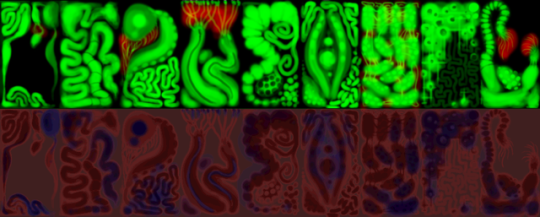
(To clarify I'm mostly talking about base-game lore and not including Downpour, but honestly most of these things can transfer over)
Qualia
One thing that’s relatively hidden in Rain World’s text and subtext is the concept of qualia. Qualia is described as being, “sensory experiences that have distinctive subjective qualities but lack any meaning or external reference to the objects or events that cause them.” It’s a personal sensory experience that cannot be comprehended by another person other than the individual themself, and are often hard to convey via language.
Qualia is a reoccurring motif in Rain World, but what’s more important is the way in which it’s conveyed to the player. The picture that’s painted is that of a world or civilization that placed a great importance on the individuals’ experience, and it’s shown through pearls or environmental details.
Here are some examples of qualia appearing in the text through pearls.
“It's qualia, or a moment - a very short one. Someone is holding a black stone, and twisting it slightly as they drag their finger across the rough surface. The entire sequence is shorter than a heartbeat, but the resolution is extraordinary.”
“A memory... but not really visual, or even concrete, in its character. It reminds of the feeling of a warm wind, but not the physical feeling but the... inner feeling. I don't think it has much utility unless you are doing some very fringe Regeneraist research.”
“This one... is authored by Five Pebbles, when he was young. There has been an attempt to scramble the data, but it's sloppily done, and most is still somewhat legible. It's written in internal language, or thoughts, so it is hard for me to translate so you would understand.”
But the most prominent examples of qualia and it’s importance in this world are the Memory Crypts and possibly ancient naming conventions. The deep purple pearl (shortened) found in Shaded Citadel states,
“In this vessel is the living memories of Seventeen Axes, Fifteen Spoked Wheel, of the House of Braids (…) Seventeen Axes, Fifteen Spoked Wheel nobly decided to ascend in the beginning of 1514.008, after graciously donating all (ALL!) earthly possessions to the local Iterator project (Unparalleled Innocence), and left these memories to be cherished by the carnal plane. The assorted memories and qualia include:”
Ancients likely mutated their own neural tissue into the cabinet beasts we see in Shaded, which were used to store their memories and qualia before ascension. Even james said once "how 5 pebs got the rot is a good hint here" in response to someone asking how cabinet beasts work, and how they're made.
Adding on to this, ancient (and iterator) naming conventions seem to be built off of the concept of qualia, with them focusing on individual images or experiences.
Nineteen Spades, Endless Reflections
Droplets upon Five Large Droplets
Two Sprouts, Twelve Brackets
Looks to the Moon
Generally, this all points to a world focused on the expression and preservation of the individual experience. You could even consider some of the echo dialogue as more evidence for this running motif, but I already have too many quotes lol.
Ascension
So now time to talk about my interpretation of ascension. In short, you turn into a worm, but I should probably explain more than that.
So its been surfacing on rw-tumblr that the light in the end of the game is called the egg in files. Although file names shouldn't be taken as fact or canon, it is pretty obvious given the birth imagery.
But something a little lesser known is what happens to the worm that takes us down to the void-sea depths. Void worms normally have a bright glowing effect, on their body, which is present for ours as well. But after it unhooks us, it swims down, and when it passes us on it's way back that glowing effect is gone.
To be honest, I don't really think this can be interpreted in many ways, but the most obvious one and the one I personally subscribe to is that the worm laid the egg. Biology and spirituality really aren't that different in Rain World, it's implied that karma is stored in the brain through Five Pebbles's slideshow. Adding on to that, we see voidspawn after eating an iterator neuron. One's spiritual state is innately tied to their mental state, and that dictates what and what they can't perceive.
And for that reason I decide to take a more biology leaning approach to what happens in the ending. At face value, we are fertilizing the egg of a void worm to be reborn into a voidspawn.
Not only do void spawn and void worms have multiple characteristics in common, (worm like bodies, tendrils/tentacles, glowing heads, void spawn look microbial and void worms are likely some of the oldest "life" in game)


but voidspawn are seen inside egg-like coverings and share the same egg light seen in the end of the game, confirmed to be the same thing by Videocult in a livestream they did.
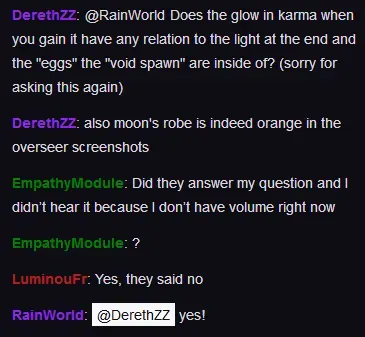
I believe that all this points to ascension being re-birth into a voidspawn, which eventually undergoes metamorphose into a worm. Higher-dimensional beings, who manifest and give birth to a new world.
So how does this tie in with qualia? Another thing you might know is that the area in which void spawn are most plentiful is Shaded Citadel and areas in Shoreline near Shaded. And shaded is absolutely packed with Cabinet Beasts, even outside Memory Crypts. I believe these qualia-storing creatures are what manifest voidspawn.
From what we see in ascension, it still looks physical and largely based around the real world. Hunter still has his scars and see's an iterator, survivor sees the slug tree in a more mystical and formless state, and monk sees survivor frankly just looking like a normal slugcat. I think that ascension is a product of qualia. We transcend our earthly knowledge via the egg, and our own qualia is used to give birth to a new world. This is why voidspawn appear most in Shaded Citadel.
Now I won't be getting into Void-Worm theories too much here, I'm mostly focused on ascension but I can't ignore the Gnosticism parallels. For those who don't know, Void Worms heavily resemble the Yaldaboath from Gnosticism, along with sharing some similar celestial motifs.
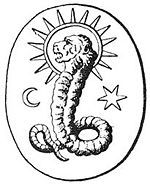
and running with that some people theorize that, like the Yaldabaoth, void worms are responsible for manifesting the material world. Ascension seems to be a mix of the concepts of Gnosis and Nirvana, but I believe it might lean more on Gnosis.
From my limited knowledge, Gnosis is a few things, some of which being a state achieved from experiences or intuitions, and an essential part to salvation is personal knowledge. While researching a bit, I came across this text by Peter Wilberg called "From NEW AGE to NEW GNOSIS" which brings up some comparisons between Gnosticism and qualia as well.
"Gnosis is subjective knowledge of an inner universe made up not of matter, energy, space or time but of countless qualitative spheres or ‘planes’ of awareness – a knowledge obtained directly through inter- subjective resonance. It is the subjective science of this inner universe."
One thing though that has been brought up when discussing this is how this can be consolidated with the tone of the ending. It is pretty un-ambiguously happy, but if we're going with the Void worm Yaldaboath theory then that would put a bit of a sour twist on it right?
I agreed with these for some time, but now I actually think it ties in perfectly with Rain World's core themes as stated by the devs, "overcoming differences and finding empathy." I don't think the void worms are "evil" or malevolent, but I think they (and subsequently us after ascending) play a key role in demonstrating this theme.
By manifesting the physical world, we allow these souls to experience life and develop their own qualia so one day they can ascend themselves. We are shown compassion, and pass it forward.
622 notes
·
View notes
Note
Where is the evidence that Crowley is verbally, emotionally and physically abused by Hell? We ASSUME he has been tortured at some point but it has never been made clear. He says "my lot do not send rude notes" but he never elaborates on any actual punishment so I'm just wondering.
Hi!
The evidence is a) in the subtext and b) in the scriptbook itself! The subtext is worthy of its own post because it's a lot and it will get very elaborate very quick, so let's focus on textual evidence for now.

We KNOW that Crowley got pulled down to hell so they could punish him for breaking the rules, and it is repeated over and over again how hell tortures both people and other demons. They don't just give him paperwork—they hurt him. The demon talking to Beelzebub got his tongue ripped out, Shax threatened to rearrange his organs (and that was not an empty threat judging by how she pulverized one of the Erics), and hell is full of screams and despair.



We SAW how hell tortures the damned (-> Spinnetime), and that is well. Proper torture. So whatever they do to punish demons will also be physical and mental torture. Demons hurt and kill each other on the daily, we see that with Beez, Hastur, and Shax, among others.

Another example:

They dissolved one of their own just to test the holy water, do you really think they have reservations about torturing someone? Do you really think Crowley would be absolutely terrified for his life and would rather be destroyed than go back if they did not abuse him?
It's all right there on the screen, just because there's no Neil Gaiman voice-over detailing everything they do to him doesn't mean it's not canon.
#alex answers asks#alex talks good omens#good omens#crowley#aziraphale#good omens season 2#go2#aziracrow#crowley x aziraphale#ineffable husbands#ineffable wives#ineffable spouses#good omens meta
333 notes
·
View notes
Text
The true post-cyberpunk hero is a noir forensic accountant

I'm touring my new, nationally bestselling novel The Bezzle! Catch me in TOMORROW (Apr 17) in CHICAGO, then Torino (Apr 21) Marin County (Apr 27), Winnipeg (May 2), Calgary (May 3), Vancouver (May 4), and beyond!

I was reared on cyberpunk fiction, I ended up spending 25 years at my EFF day-job working at the weird edge of tech and human rights, even as I wrote sf that tried to fuse my love of cyberpunk with my urgent, lifelong struggle over who computers do things for and who they do them to.
That makes me an official "post-cyberpunk" writer (TM). Don't take my word for it: I'm in the canon:
https://tachyonpublications.com/product/rewired-the-post-cyberpunk-anthology-2/
One of the editors of that "post-cyberpunk" anthology was John Kessel, who is, not coincidentally, the first writer to expose me to the power of literary criticism to change the way I felt about a novel, both as a writer and a reader:
https://locusmag.com/2012/05/cory-doctorow-a-prose-by-any-other-name/
It was Kessel's 2004 Foundation essay, "Creating the Innocent Killer: Ender's Game, Intention, and Morality," that helped me understand litcrit. Kessel expertly surfaces the subtext of Card's Ender's Game and connects it to Card's politics. In so doing, he completely reframed how I felt about a book I'd read several times and had considered a favorite:
https://johnjosephkessel.wixsite.com/kessel-website/creating-the-innocent-killer
This is a head-spinning experience for a reader, but it's even wilder to experience it as a writer. Thankfully, the majority of literary criticism about my work has been positive, but even then, discovering something that's clearly present in one of my novels, but which I didn't consciously include, is a (very pleasant!) mind-fuck.
A recent example: Blair Fix's review of my 2023 novel Red Team Blues which he calls "an anti-finance finance thriller":
https://economicsfromthetopdown.com/2023/05/13/red-team-blues-cory-doctorows-anti-finance-thriller/
Fix – a radical economist – perfectly captures the correspondence between my hero, the forensic accountant Martin Hench, and the heroes of noir detective novels. Namely, that a noir detective is a kind of unlicensed policeman, going to the places the cops can't go, asking the questions the cops can't ask, and thus solving the crimes the cops can't solve. What makes this noir is what happens next: the private dick realizes that these were places the cops didn't want to go, questions the cops didn't want to ask and crimes the cops didn't want to solve ("It's Chinatown, Jake").
Marty Hench – a forensic accountant who finds the money that has been disappeared through the cells in cleverly constructed spreadsheets – is an unlicensed tax inspector. He's finding the money the IRS can't find – only to be reminded, time and again, that this is money the IRS chooses not to find.
This is how the tax authorities work, after all. Anyone who followed the coverage of the big finance leaks knows that the most shocking revelation they contain is how stupid the ruses of the ultra-wealthy are. The IRS could prevent that tax-fraud, they just choose not to. Not for nothing, I call the Martin Hench books "Panama Papers fanfic."
I've read plenty of noir fiction and I'm a long-term finance-leaks obsessive, but until I read Fix's article, it never occurred to me that a forensic accountant was actually squarely within the noir tradition. Hench's perfect noir fit is either a happy accident or the result of a subconscious intuition that I didn't know I had until Fix put his finger on it.
The second Hench novel is The Bezzle. It's been out since February, and I'm still touring with it (Chicago tonight! Then Turin, Marin County, Winnipeg, Calgary, Vancouver, etc). It's paying off – the book's a national bestseller.
Writing in his newsletter, Henry Farrell connects Fix's observation to one of his own, about the nature of "hackers" and their role in cyberpunk (and post-cyberpunk) fiction:
https://www.programmablemutter.com/p/the-accountant-as-cyberpunk-hero
Farrell cites Bruce Schneier's 2023 book, A Hacker’s Mind: How the Powerful Bend Society’s Rules and How to Bend Them Back:
https://pluralistic.net/2023/02/06/trickster-makes-the-world/
Schneier, a security expert, broadens the category of "hacker" to include anyone who studies systems with an eye to finding and exploiting their defects. Under this definition, the more fearsome hackers are "working for a hedge fund, finding a loophole in financial regulations that lets her siphon extra profits out of the system." Hackers work in corporate offices, or as government lobbyists.
As Henry says, hacking isn't intrinsically countercultural ("Most of the hacking you might care about is done by boring seeming people in boring seeming clothes"). Hacking reinforces – rather than undermining power asymmetries ("The rich have far more resources to figure out how to gimmick the rules"). We are mostly not the hackers – we are the hacked.
For Henry, Marty Hench is a hacker (the rare hacker that works for the good guys), even though "he doesn’t wear mirrorshades or get wasted chatting to bartenders with Soviet military-surplus mechanical arms." He's a gun for hire, that most traditional of cyberpunk heroes, and while he doesn't stand against the system, he's not for it, either.
Henry's pinning down something I've been circling around for nearly 30 years: the idea that though "the street finds its own use for things," Wall Street and Madison Avenue are among the streets that might find those uses:
https://craphound.com/nonfic/street.html
Henry also connects Martin Hench to Marcus Yallow, the hero of my YA Little Brother series. I have tried to make this connection myself, opining that while Marcus is a character who is fighting to save an internet that he loves, Marty is living in the ashes of the internet he lost:
https://pluralistic.net/2023/05/07/dont-curb-your-enthusiasm/
But Henry's Marty-as-hacker notion surfaces a far more interesting connection between the two characters. Marcus is a vehicle for conveying the excitement and power of hacking to young readers, while Marty is a vessel for older readers who know the stark terror of being hacked, by the sadistic wolves who're coming for all of us:
https://www.youtube.com/watch?v=I44L1pzi4gk
Both Marcus and Marty are explainers, as am I. Some people say that exposition makes for bad narrative. Those people are wrong:
https://maryrobinettekowal.com/journal/my-favorite-bit/my-favorite-bit-cory-doctorow-talks-about-the-bezzle/
"Explaining" makes for great fiction. As Maria Farrell writes in her Crooked Timber review of The Bezzle, the secret sauce of some of the best novels is "information about how things work. Things like locks, rifles, security systems":
https://crookedtimber.org/2024/03/06/the-bezzle/
Where these things are integrated into the story's "reason and urgency," they become "specialist knowledge [that] cuts new paths to move through the world." Hacking, in other words.
This is a theme Paul Di Filippo picked up on in his review of The Bezzle for Locus:
https://locusmag.com/2024/04/paul-di-filippo-reviews-the-bezzle-by-cory-doctorow/
Heinlein was always known—and always came across in his writings—as The Man Who Knew How the World Worked. Doctorow delivers the same sense of putting yourself in the hands of a fellow who has peered behind Oz’s curtain. When he fills you in lucidly about some arcane bit of economics or computer tech or social media scam, you feel, first, that you understand it completely and, second, that you can trust Doctorow’s analysis and insights.
Knowledge is power, and so expository fiction that delivers news you can use is novel that makes you more powerful – powerful enough to resist the hackers who want to hack you.
Henry and I were both friends of Aaron Swartz, and the Little Brother books are closely connected to Aaron, who helped me with Homeland, the second volume, and wrote a great afterword for it (Schneier wrote an afterword for the first book). That book – and Aaron's afterword – has radicalized a gratifying number of principled technologists. I know, because I meet them when I tour, and because they send me emails. I like to think that these hackers are part of Aaron's legacy.
Henry argues that the Hench books are "purpose-designed to inspire a thousand Max Schrems – people who are probably past their teenage years, have some grounding in the relevant professions, and really want to see things change."
(Schrems is the Austrian privacy activist who, as a law student, set in motion the events that led to the passage of the EU's General Data Privacy Regulation:)
https://pluralistic.net/2020/05/15/out-here-everything-hurts/#noyb
Henry points out that William Gibson's Neuromancer doesn't mention the word "internet" – rather, Gibson coined the term cyberspace, which, as Henry says, is "more ‘capitalism’ than ‘computerized information'… If you really want to penetrate the system, you need to really grasp what money is and what it does."
Maria also wrote one of my all-time favorite reviews of Red Team Blues, also for Crooked Timber:
https://crookedtimber.org/2023/05/11/when-crypto-meant-cryptography/
In it, she compares Hench to Dickens' Bleak House, but for the modern tech world:
You put the book down feeling it’s not just a fascinating, enjoyable novel, but a document of how Silicon Valley’s very own 1% live and a teeming, energy-emitting snapshot of a critical moment on Earth.
All my life, I've written to find out what's going on in my own head. It's a remarkably effective technique. But it's only recently that I've come to appreciate that reading what other people write about my writing can reveal things that I can't see.

If you'd like an essay-formatted version of this post to read or share, here's a link to it on pluralistic.net, my surveillance-free, ad-free, tracker-free blog:
https://pluralistic.net/2024/04/17/panama-papers-fanfic/#the-1337est-h4x0rs

Image:
Frédéric Poirot (modified)
https://www.flickr.com/photos/fredarmitage/1057613629 CC BY-SA 2.0
https://creativecommons.org/licenses/by-sa/2.0/
#pluralistic#science fiction#cyberpunk#literary criticism#maria farrell#henry farrell#noir#martin hench#marty hench#red team blues#the bezzle#forensic accountants#hackers#bruce schneier#post-cyberpunk#blair fix
186 notes
·
View notes
Note
Can you recommend fanfiction that you personally really like?
Yes! Love this ask. I’ve never made a Zutara fic rec list partially because I’ve read so many wonderful stories over time that I find the prospect daunting!
But there are absolutely certain stories that I have a personal soft spot for, that I return to again and again. And that’s my criteria for what’s included below. This is a sampling of fics that I find myself coming back to, in no particular order. I may come back and add more, because this list is so far from exhaustive. A mix of ratings (marked), so keep that in mind.
Wish I Was the Moon by Like a Dove (T), post-canon: There’s so much that I love about the way this one-shot explores Katara’s character and what she faces post-canon, how she frees herself, strikes out in the world and finds her way home. Her feelings for Zuko, and her inner-conflict around them, are rendered tangibly, both through scene and subtext. A really good example of how an author can show a character’s lack of/journey to self-knowledge without breaking voice.
Refraction by caroes3725 (E), post-canon: When I started reading Zutara fanfic (for me this was in 2020), this was the fic I was looking for—a deep, realistic-to-canon, in-character exploration of how Zutara could unfold after the events of ATLA in a way that gives Katara in particular the arc she deserves. Really well-done development of the Fire Nation court world, well-developed characters, shining dialogue. An amazingly well-worth-it slow burn.
Wildfire by rainstormdragon (E), post-canon: To me this story is kind of a steamy Zutara thesis. The characters are so spot on and alive, their flaws are on full display in a way that feels realistic, and their chemistry is powered by their compatibility—matched in passion and stubbornness, and also in what they want from life. And I think it really gets Aang, too, which is something that can be hard to find in ZK fic. Also really hot, but that's only part of what makes it really shine.
Partners in Learning by evergreenonthehorizon (T), Modern AU: One of the things I love in modern AUs is watching an author weave that invisible string between these characters. Sometimes, it’s by writing narrative arcs that parallel the series, and sometimes it’s by drawing out the personality traits that make the characters both lovable to readers and such a compelling match and watching that spark bloom into flame. This beautifully written story does that so, so well in a really compelling Modern AU setting. Zuko and Katara here are so wonderfully lovable, and it’s a joy to watch them fall for one another, too.
Journeys by Smediterranea (E), Modern AU: In real life, I want to see my friends in relationships with people who can recognize why they’re so particularly amazing. That potential, I think, part of the appeal of ZK as a ship, and that’s part of the special magic of this fic. Watching these two characters get to know one another—really see one another—and fall in love deliciously sweeps the reader up. Plus, really fun, in character cameos from the rest of the Gaang along the way.
Spark, set fire by marijayne (T), Modern AU: literary fanfic, and I mean that in the best way. This story is beautiful and bittersweet, the latter is not often something I seek out in fanfic (where I hide from life), but here it’s gorgeous and worth it. The world building here is really cool—allows the author to explore some of a set of cultural issues/interactions that both echo the ATLA world and ours. The characters are so tenderly drawn (dadko especially)—and the connection between them builds beautifully and tangibly—and the longing is…chef’s kiss.
Wrong when it's right by nire (T), Book 1 Canon Divergence: Before I read this, I couldn't imagine wanting to read a Book 1 Zutara. After, I wanted more. Bickering, bed-roll sharing, shared heat, tenderness and common ground. A delight from start to finish.
Anyway, thanks for asking and happy reading! <3 And if you want more recs, let me know.
243 notes
·
View notes
Text

LET’S TALK ABOUT EXPLORING LOKI & MOBIUS THROUGH THE LENS OF QUEER EXPERIENCE
Thank you for this request, @nabananab
Before I dig into this juicy ask, I think it’s important to note (however obvious the fact maybe) that an individual’s unique engagement with art is an inherent and integral part of art. The intention of the artist and the sociopolitical influence of culture, while important in our interpretation of a work, are not the sole source of drawing the work’s meaning. We are all artists in one form or another. I consider myself one of the pen, and nothing is more important to me than art giving someone a sense of emotional connection. I should hope other artists would agree, and for this reason I am an ardent believer in art taking on a life of its own once it has been created. The creator’s word, while it matters to some degree, does not supersede an individual’s relationship with the creation. Our histories, our desires, our fears, our likes, our dislikes, indeed our infiniteness as fragile human beings, allow us to create an elevated, spiritual interpretation beyond the confines of original intent. With art, there is no such thing as “reaching” or “reading too deeply”.
I leave this message with all of you as we look at these beloved characters through the lens of queer experience.
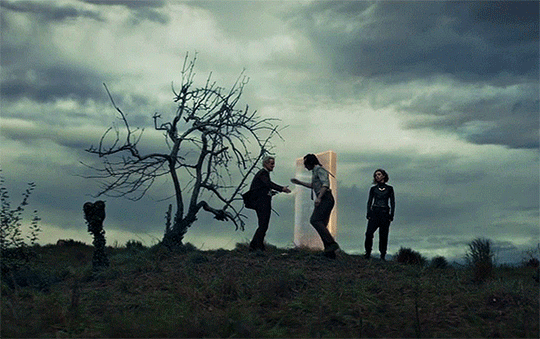
LOKI
Culture influences what we see and hear, which in turn influences artistic portrayal. Setting aside Norse myth, Marvel’s Loki is a classic example of a queer-coded villain (later canonized as a queer antihero). Deception, daggers, sexual temptation, transformation, and magic are all culturally tied to the “immoral” facets of femininity. Just as a strong, independent woman untethered to the control of man is deemed a “wicked woman”, a man demonstrating gender ambiguity and like qualities is similarly judged. Only masculinity is viewed as pure and good, and this no doubt was—and continues to be—a key force in white, western colonization’s destructiveness. It all but crushed our rich global history of divine femininity, gender diversity, and romantic and sexual expression.
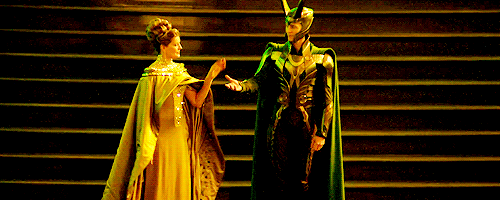
Asgard, as Marvel portrays it, is without a doubt a masculine-dominant warrior society. Only two women feature prominently: Queen Frigga and Lady Sif. Whereas Sif embraces her masculine qualities and fits in easily with Thor and the Warriors Three, Queen Frigga embraces her feminine powers, though her authority is submissive to the All-Father, Odin. Her influence is most heavily seen in her adopted son, Loki, with whom she shared and taught magic in hopes that Loki might “feel some sun on himself” despite the “long shadows [Thor] and [Odin]” cast. The magic that Frigga gifts Loki, however, attracts scorn. The subtext here is that Loki’s specialness, his individuality, comes from feminine powers despite presenting as a man, and a gender ambiguous one at that. Unlike Thor and Odin, he is not masculine. While strong, he does not exhibit Thor’s brute strength. He is cautious, thoughtful, another feminine quality, whereas Thor’s courageousness often veers toward foolhardy and brash.
Thus, if Loki cannot be loved and accepted as he is (a queer person of another race), he will force love and acceptance through the power of the throne. Kings oft inspire fear, coercing subjects to love them whether they wish to or not. But we know Loki never truly wanted the throne. The throne is a mere distraction from, perhaps even a poor replacement for, what he truly wants: genuine love and acceptance that cannot be bought. Unfortunately, Loki believes he will never get these things, which is why, when Mobius questions him, Loki’s desire for control (Loki, King of the Midgard; Loki, King of the Nine Realms; Loki, King of Space) can never be satiated. Mobius challenges Loki for the exact purpose of revealing this to him. What do you really want? At this point, Loki does not have the words to form an answer. In S2E5, Syvlie raises the question Mobius originally asked in S1E1. It is then, after experiencing Mobius’s friendship and the other relationships that come to being as a result (including Sylvie’s), that Loki can articulate his answer.
Loki’s othering, even before the discovery of his true identity as a Jotun (an allegory for a villainized foreign race), creates a lonely environment in which Loki’s potential for goodness is quashed by centuries of resentment, bitterness, and jealousy. His attempts at masculinity take the form of violence, all of which are, as Loki admits in S1E1, “part of the illusion; the cruel elaborate trick conjured by the weak to inspire fear.”
Loneliness and the desire for love and acceptance are a universal human experience, but they are felt far more acutely within our intersectional queer communities.
MOBIUS
His fascination with Loki is compelling because there are many things we can infer about its reasons. The first, most obvious explanation is Mobius’s “soft spot for broken things”, which is in some ways tied to his qualities as a compassionate, forgiving, and supportive father. A secondary explanation is a wish for partnership. We know from S1 that Mobius’s friendship with Ravonna spanned eons. We later learn in S2E6 that he and Ravonna started out as peers, hunters. They were partners on the field, but where Mobius “failed” because of his humanity, Ravonna “advanced” because of her ruthlessness. This change in relational dynamics left him partner-less. Finally, a third, less obvious reason is Mobius’s desire to express himself in ways Loki does so effortlessly. That desire may come from the suppression and repression of his own softspoken queerness in order to survive the fascist culture of the TVA.
Mobius is captivating for many reasons. Whereas Loki is a textbook example of culture viewing “queerness as evil”, “queerness as flamboyance”, “queerness as stylishness”, “queerness as loudness”, “queerness as sexual promiscuity and deviance”, “queerness as chaos”, Mobius very much aligns with the image of a straight-passing, repressed queer individual. This is an identity that does not get as much attention or presence in artistic media as it deserves, for there are many who need this representation to reflect them. He is not stereotypically queer by any means: he is not colorful. He is not stylish, flamboyant, or loud. His sex appeal primarily derives from the viewers’ attraction to his personality, though it certainly helps that Owen Wilson is quite handsome.
Combine these three reasons, and it becomes easy to see how a character (or person!) like Mobius might fall in love with a character (or person!) like Loki.
There is a certain amount of beautiful irony in how Loki and Mobius affect one another and consequently their identities. Mobius, feeling compassion toward an individual who has been brutally othered and oppressed, seeks to free Loki from the confines of his narrative, as determined by the “Time Keepers”. The only feasible way to do this is to bring a variant of Loki out of the timeline and into the TVA. Mobius then provides Loki with the opportunity to change by: acknowledging Loki’s strengths, giving Loki the chance to use his strengths in productive ways, praising Loki when he does well, listening to Loki, believing in Loki, calling out Loki, and accepting Loki as he is, with all his history, without judgement. Mobius does not try to force change like Thor or Odin. Rather, he creates an environment in which change could happen naturally. This kindness and, indeed, what becomes unconditional love by the end of S1E4, allows Loki to embrace his authentic queerness with self-love and use his feminine powers for altruism rather than masking them with self-hatred and masculine rage.
FREEING LOKI
In S1E1, Mobius is enthralled with Loki’s hijinks as the handsome, charming, devil-may-care, D.B. Cooper. This minor escapade in Loki’s life, which was likely only intended for laughs by the writer, reveals something interesting about Mobius: Loki’s mischievousness, his magic, his cunning, are all quite endearing to him when no real harm is being inflicted. That is, Loki, when not under duress, is someone to be admired when he’s being himself. We admire in people what we wish we had in ourselves, and this, at times, may lead to powerful attraction.
Loki, for his part, does much the same for Mobius. The environment (the TVA) which allowed Loki to thrive is also the same environment that has abused and constrained Mobius.
The heat that Ravonna presses upon Mobius, however, changes his tone with Loki himself. When Loki asks Mobius why he “[sticks] his neck out for [him]”, Mobius provides Loki with two options to choose from: “A. He sees a scared little boy shivering in the cold, or B. He will say whatever he needs to say to get the job done”. Option A, while insulting, has compassion layered beneath the barb. Loki, an expert at cloaking truth with meanness, sees through this and indirectly chooses what he believes to be true in the cafeteria scene: that Mobius feels sympathy for Loki’s painful childhood. The subtext of this acknowledgement is that the true means to the end is reversed: Mobius doesn’t need Loki to catch the Variant on the timelines. Mobius needs the Variant to free Loki from the timelines. The Variant is an excuse and another agent of poetic irony: when Sylvie unleashes the multiverse, she literally frees Loki of his predetermined narrative.
The conceit of S1E1 is that Mobius intends to use Loki for the “good” of the Sacred Timeline. It is important to remember that characters, while not real, are meant to mirror human complexity. Multiple, seemingly conflicting things may be true concurrently. In S1E2, we see in Mobius’s conversations with Ravonna that he deeply believes in Loki’a capacity to be a wonderful person and wants him to have the opportunity to change. His enthusiasm for these things outshines his desire to catch Sylvie.

And, because the Variant is Loki, because Sylvie is Loki, because, as she says, “[they] are the same”, Mobius’s own freeing of Loki, his unconditional love for him, cascades from Loki to Sylvie. Sylvie would not be free to live as she pleases if not for Mobius’s compassion for Loki in the first place.
In S1E4, Loki reveals the TVA’s sham. Mobius’s sense of self becomes fragile alongside his sense of partnership with Loki. But because of our sociopolitical culture’s influence on capitalism, the creative voices of the Loki series self-censures what could be (what is) a queer romance. This self-censureship makes itself known in Mobius’s own self-censureship. His jealousy and heartbreak cannot be spoken directly. It must be spoken through the words of a woman, someone who presents as the opposite sex. Through a looping memory of a scornful Sif telling Loki, “You are alone and always will be”, Mobius makes known the nature of his feelings for him.
BUT WHO WILL FREE MOBIUS?
In the same cafeteria scene in S1E2, Loki asks Mobius if he’s ever ridden a jet ski. Mobius’s response is demure, saying him riding one would “cause a branch for sure”. The jet ski gives the audience another clue as to what Mobius seeks in life: something fun, thrilling, and reckless. Yet Mobius sets aside his desires for what he believes is for the good of the TVA, and thus humanity. This suppression and repression of authentic selfhood mirrors the queer experience of living within a heteronormative culture, especially one with religious doctrines that equate pleasure with sinfulness.
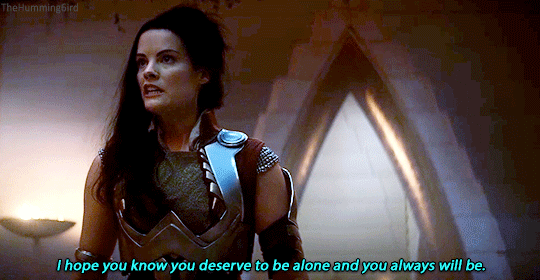
Because Mobius extended his heart, his partnership, his love (symbolized by twin daggers hidden in his locker [a closet]; notably a male phallic symbol of which there are a pair [partners]) and was soundly rejected, Mobius retaliates with the loneliness he himself feels. This loneliness may be interpreted as an allegory for the loneliness of being closeted as opposed to the loneliness of being out but othered.
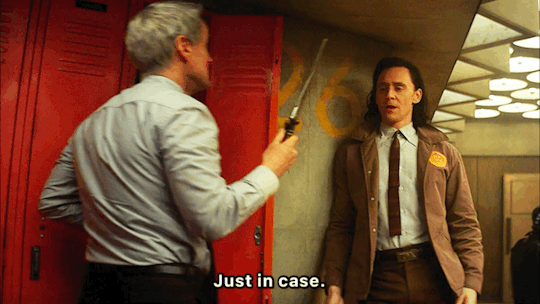
Ultimately, Mobius’s love for Loki shifts from selfish desire to unconditional love when he chooses to help Loki save Sylvie. In S1E5, it is conspicuous that after delivering Sylvie safely to Loki’s side, Mobius’s partings words are, “Guess you got away again”, to which Loki replies, “I always do”, which echos the lover’s trope of “the one that got away”.
[It drives me absolutely bananas that I can't find the specific gif I need when I literally saw it multiple times earlier this week but didn't need it THEN]
Owen’s acting choice is interesting here. He laughs, smiles, then looks down before looking up again, his eyes shifting from fondness to what feels like longing. Mobius extends his hand, a sensible choice for someone who believes his love is unrequited and is unsure of how Loki defines their relationship. Loki, appreciating what Mobius has done for him, closes the distance with an embrace and thanks Mobius for his friendship.
In S2E1, upon Loki’s time-slipping into the war room, whatever apprehensions Mobius had about physical contact was wiped away by the collapse of the TVA and the memory of Loki’s hug. In this scene, it becomes clear to Mobius that Loki is panicking. He makes the executive decision to use his physical contact as a grounding force, relocates Loki to a quiet environment, asks after Sylvie with no bitterness in his voice, then prioritizes Loki’s physical well-being. Perhaps, in Mobius’s view, his love is unrequited, but there is nothing in place to stop him from expressing that love more freely while honoring Loki’s feelings for Sylvie. This regard, which may be construed as platonic, may also be viewed romantic, courtly love.
The fight between Loki and Sylvie in S1E6 sets the stage for Mobius to receive Loki and become a refuge for heartbreak.
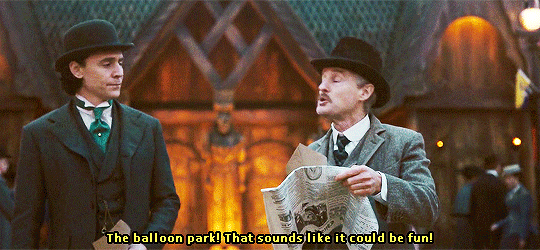
S2E2 and S2E3 has Loki’s and Mobius’s temperaments when it comes to investigating flipped. In S1, Mobius was focused on the mission and often had to reign in Loki. In S2, Mobius is more casual, more willing to take his time and enjoy the sleuthing as it unfolds, while Loki administers pressure to stay focused. The question is why?
In S2E2, Brad attacks Mobius’s sense of self. He points out how weird it is that Mobius is not at all curious about looking at his timeline and stresses that the TVA, and everything in it, isn’t real. Brad calls into question Mobius’s reason for staying. Knowing that the answer is Loki, we can surmise through the queer lens that Brad also corners Mobius into potentially outing himself in front of the object of his affections, someone he believes does not return his feelings, and whose knowledge of those feelings may threaten their friendship. This is a traumatic experience for queer people in the real world, and this extra layer of emotional conflict adds depth to Mobius’s violent response.
Mobius influenced Loki in a myriad of ways. One that has not been discussed yet is an appreciation for focus and order. Loki, in turn, has cracked the door open for Mobius to explore pleasure. We can speculate that, in his own way, Mobius is testing what happiness could look like living a life between the TVA and the timelines. For him, this means cocktails at the theater, cracker jacks, and exploring the World’s Fair, all of which are pleasurable on their own but are even more so with Loki’s company. His queerness, once again, is quiet, mundane, but playful in its own right, and finally brave enough to explore. These scenes suggest that Mobius is indeed happy at the TVA and, as we see in the finale, this happiness is solely rooted in his relationship with Loki and the emotional intimacy they share together.

Loki expresses concern for Mobius, noting that he has “never seen him like that before.” Mobius, interestingly, deflects every concern by absurdly blaming Loki: “He got under your skin”, “I was following you!” The psychological undercurrent here is that Loki is the reason why Brad got under Mobius skin. Loki is the person that Mobius will follow.
Loki takes Mobius’s distress in stride, responding in a way the Mobius normally would. However, Brad’s question piques his interest, and his own care for Mobius prompts him to gently challenge Mobius’s lack of interest in his own timeline. Mobius’s reason for avoidance is, “What if it’s something good?”
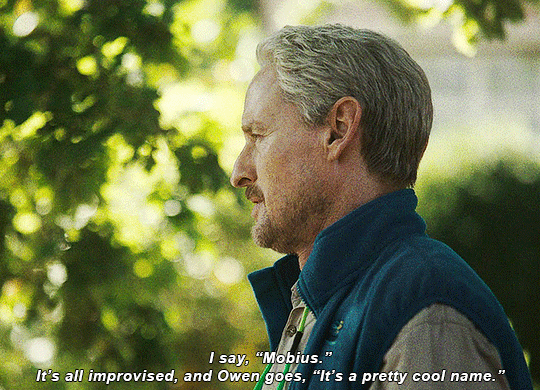
In S2E5, it’s interesting that “good” in this narrative is defined as a heteronormative fantasy of a house, two kids, and (possibly) a puppy and a snake. The “good” in Mobius’s original timeline, however, is imperfect. There is a partner that is missing (partners being a recurring theme in the series, particularly in S2E3), pronounced gone not once but twice. The entire scene between Don and Loki has been discussed at length by many, so there’s no need to reiterate it here. However, let’s bring our attention to Mobius’s avoidance of this “good” because this avoidance resonates with another queer experience.
The TVA, for Mobius, is the place where he studied, saved, and developed a close relationship with Loki. The fear of the “something good” is the fear of being confronted with something Mobius “should” want more than the TVA, and therefore “should” want more Loki. The fear is wanting something (or feeling pressured to want something) other than a queer relationship with no children. The question of “choice” is impacted by what is considered the “norm”.
S2E5 very pointedly focuses on the concern of choice, especially Mobius’s choice, in the bar scene between Loki and Sylvie. “Mobius should get a choice now, no?” At this point, Loki’s regard for Mobius has finally caught up with the romantic nature of Mobius’s feelings for him. And Loki, living his own queer experience, is also afraid of his true desires like Mobius. In being part of the intersectional queer community, the psychological need to guard against disappointment is high and commonplace. Desires are easily disappointed by the expectations of oppressive social mores. This survival tactic manifests itself with our hope and heartbreak with mainstream media, Loki the series being among them.
But Sylvie, the harbinger of true and absolute freedom, takes on the role of supportive ex and challenges Loki to answer Mobius’s question in S1E1: “What do you want?”
In this, Mobius and Loki’s individual relationships with the TVA are identical. It was never about where (the TVA), when (time works differently at the TVA), or why (the timelines). It was about who. It was about each other. The TVA represents a liminal space which became home by virtue of the people who brought love into it. The TVA is code for Loki and Mobius when each speaks of it.
Again, the artists behind the media must self-censure. In this, Loki also self-censures while giving the truth. “I don’t want to be alone. I want my friends back.” It cannot be denied that Mobius is Loki’s first truest and closest friend. “I don’t want to be alone. I want Mobius back.” Sylvie appreciates and validates this desire, but also points out that showing the TVA is something that cannot be unseen. The implication of this response suggests that Sylvie believes that Loki’s friends will feel compelled to join the TVA out of moral pressure. She reiterates the true lives that are being lived, and Loki, loving his friends, loving Mobius, elects to not take that away from them. “You are just fine without the TVA.”
Yet, Loki must choose an act of profound selfless love to save everyone. In doing so, he saves and frees Mobius in the way Mobius saved and freed him. The tragedy and, once again, poetic irony is that they both would have chosen each other. In giving everyone freedom, the true freedom of Loki and Mobius is sacrificed. This double-standard reflects in our reality between those who identify as cis and heterosexual and those who do not.
When Mobius looks at his timeline in S2E6, he does so for one reason: that timeline survived because of Loki’s sacrifice. He must honor that sacrifice and see what Loki protected. Mobius appreciates what he finds, but he doesn’t belong there. It is not what he ultimately longs for. And there must be worry, shame, in recognizing he would prefer to give up the house and two children if a life with Loki were a viable choice.
We all experience loss in our lives. Loss without a goodbye is also commonplace but is another pain that is more acute within the intersectional queer community. I speak of missed opportunities for happiness due to external forces. I speak of loss of self. I speak of loss of friends and family and home. I speak of death, losing a loved one without a goodbye, because same-sex lovers are not considered next of kin, an impossibility without marriage. Marriage echoes back to Don, who has no spouse, and Mobius, who has no partner.
#asks#loki#mobius#lokius#loki season 2#loki series#loki meta#my meta#loki analysis#my analysis#queer community#queer#queer representation#queer relationships#lgbt representation#lgbtq community#lgbtqia
244 notes
·
View notes
Text
Opinion: Scarlet and Violet are Pokémon's Queerest Games Yet (Bulbanews)
Hi it's Lisia here!! The following is an opinion piece from one of our staff members, Torchic W. Pip!! Blanc and I both loved this and like... we had to share it here LOL.

Pokémon was my queer awakening. I had silly little crushes on male and female characters alike, and I resonated with many of the designs of the series’s more gender nonconforming designs. Pokémon has always had a wink and a nod to queerness: Jessie and James’s genderbending antics, Beauty Nova in X and Y, Blanche from Pokémon GO… the list goes on. But with Scarlet and Violet, queerness shines bright as celestial stars.
“But wait!” you might say. “Scarlet and Violet has no canonical gay or trans characters! How can this thesis make sense?” Well, queer representation need not be explicit to be impactful. Sometimes, the stories queer people resonate with most are told through metaphor, from the misfits in Rudolph the Red Nosed Reindeer to X-Men to Luca and Gwen Stacy. The roots of this trace back to a history of censorship. LGBTQ+ stories have been historically censored, such as with the Hays Code. Queer people have long been unable to see stories with explicitly queer characters, so they instead turned to metaphors and symbolism. Gender nonconformity is also nothing new to the scene of video games. Metroid, Legend of Zelda, Final Fantasy, and Guilty Gear are just some of the games that play with our expectations of gender. It’s also nothing new to Pokémon. East Asian media tends to depict transness and gender nonconformity differently from the West, but for more on that, I'll direct you to this video.

Even before the release of Scarlet and Violet, gender nonconformity shined through. Take a character like Grusha, for example, who many mistook for a girl when he was first introduced. It goes a little deeper than that, though. “Grusha” is Russian for “pear”, but it’s also a diminutive for the name “Agrafena”... a female Russian name. Whether or not it was intentional, it does add an extra layer of nonconformity to Grusha. Another character with some queercoded elements is Iono: Her color palette evokes the colours of the trans flag, and her Magnemite headpieces evoke an explicitly genderless Pokémon. Baggy clothes are common among many transgender people. Her friend Bellibolt is a frog, and many frogs in real life can change their sex. In Japanese, she speaks with a Bokukko speech pattern (a girl using the masculine “boku”), which is often used for plucky characters, but also nonconforming characters. All of Iono’s names across translations evoke themes of questions. On top of all that… well, the Vtubing scene is, from personal experience, very queer. All of my friends who watch VTubers are queer in some way. More seriously, creating a persona where you can let your true self shine in a way that regular society won't allow you to... that's pretty queer.
With the release of the games, we’ve seen a wide array of characters—Rika, Saguaro, Penny, and all of the leaders of Team Star, among others—showcase a wide range of gender expressions, either in their appearances, their personalities, or their hobbies. And all of these characters are seen as heroes, as role models.

As with games before, there are two characters with queer subtext in their relationship. Hassel and Brassius have been seen by many as being in a gay relationship, bonding over a love of art, supporting each other in dark times, and giving each other pet names. Even if it's not outright stated that they're in a romantic relationship, their care for each other is a beautiful thing. Many gay coded relationships are often of younger men or women, and while these relationships are important, it's also important for older gay couples to receive some of the spotlight. After all, queer people have always existed, and it's important to remember our past and honor those who came before us, who helped paved the path to acceptance.
For the first time in a mainline game, the player character can choose any clothes, hair style, and so on regardless of gender. While the player can still only choose between being referred to by masculine or feminine terms, this is a step in the right direction, and it opens the door for many opportunities never seen before. Boys can be feminine, girls can be masculine, and both can be anywhere in between. The world of gender expression is as big as the open world of Paldea.
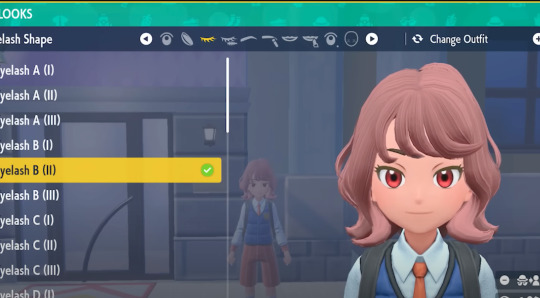
But back to Team Star. The whole Team Star path is one big, queer metaphor. Think about it: kids are bullied for how they dress or act, these misfits band together and retaliate against their bullies, finding a sort of family in each other, villains who turn out to be just the opposite… It’s a story that, in some way or form, can resonate with many kids who have, sadly, dealt with homophobia or transphobia in school. The path is a story about righting what’s wrong, about making the world a more accepting place.
Scarlet and Violet is a game about shining bright in the sky with other stars, about being your true self. Its themes are deeply resonant with the queer experience. At the end of the Team Star path, you battle Penny, whose ace Pokémon is trans flag-coloured Sylveon, and as she Terastilizes her partner, she says, “Shine bright like the starry sky and become who you really want to be!” So shine bright, trainers, and be your true self.
Oh, and of course, Quaquaval is the queer icon of all time.
[Torchic W. Pip is a Bulbanews writer with a focus on music, merchandise, and spin-off games. They're also a fanfiction author and moderator of the Writer's Workshop subforum. Outside of writing, Torchic is studying music theory and linguistics, and his favorite games are X/Y and Omega Ruby/Alpha Sapphire.]
245 notes
·
View notes
Note
idk if you've talked about it before, but what do you think of snucius?
thank you very much for the ask, anon!
i'm a big fan of it as a ship, above all because of the ways it can be used to subvert the expectations which might accompany it into something oddly beautiful.
by which i mean that the possibility of quite a manipulative snucius is actually implied by canon. sirius is absolutely suggesting something salacious with his comment in order of the phoenix about snape being lucius' "lapdog" - it's a reference to a practise called "fagging" [yes, you've read that right] traditionally understood to take place in elite, all-male british boarding schools, in which younger boys were expected to act as something akin to the servants of older ones. the expectation that fags [yes] would perform sexual favours was a fairly standard part of the whole phenomenon - and so, when sirius suggests that snape runs around being lucius malfoy's personal errand boy, he is evidently also suggesting that he bends over for the privilege.
and the idea that lucius has power over snape is suggested more broadly in canon too. the implication of the prince's tale is that snape was taken under lucius' wing as soon as he was sorted, and that lucius was the conduit through which he was groomed to become a death eater [he is also the conduit through which snape meets his death - voldemort sends him to fetch snape before he kills him]. that he supposedly relies on lucius' patronage is something draco malfoy is well aware of - when he suggests in chamber of secrets that lucius would support snape if he applied to be headmaster, he is doing so with the subtext that snape's appointment would be entirely contingent on lucius' position as chair of the governors and, therefore, that he would only be chosen because lucius would think him likely to run hogwarts how he would like to see it run - which suggests that this power dynamic wasn't just restricted to death eater meetings. and voldemort undoubtedly elevates snape to his right hand within the setting of malfoy manor at the start of deathly hallows - reversing that established power dynamic - as yet another "fuck you" to lucius after his fall from grace following the farrago in the department of mysteries.
but.
i think narcissa is telling the truth when she describes snape as "lucius' old friend". i think that something deeper than not wanting to piss off his main patron lurks behind snape's decision to protect draco. i think that there is a very credible case for lucius being the only person who actually knows the real snape, behind his mask, and his relationship with lucius being the only thing in his life which stands in contrast to the relationships which seem to define his life more profoundly [his relationships with dumbledore, voldemort, lily, and harry, for example].
you can do so much with lucius having to confront his friend having turned spy - whether snape lives or not. you can do so much with lucius - terrified and disillusioned - relying on snape's help to prevent voldemort's wrath descending upon him. and you can also just have so much light and campy fun with someone as posh and peacocking and lucius having a sallow goth boyfriend.
104 notes
·
View notes
Text
If no merwaine, then why…
Transcript and analysis below ⬇️
Transcription:
Gwaine: Thanks for everything that you did for Eira.
Merlin: There’s no need to thank me, it was the least I could do. And you seem to care for her.
Gwaine: I could hardly leave her for the Saxons, now, could I?
Merlin: [teasing] Was that your only reason for rescuing her?
Gwaine: [lying] Of course.
[Saxons attack. Gwaine fights them off, but one knocks Merlin to the ground. He curls up and shields his face, completely helpless.]
Merlin: [screaming] Gwaine!
[Gwaine turns his back on the man he’s fighting and saves Merlin. He finishes off the last Saxon without even looking, eyes still on Merlin. He helps Merlin off the ground.]
Gwaine: Are you okay?
Merlin: Yeah, I- I think so. Thank you.
Gwaine: There’s no need to thank me, Merlin. It was the least I could do.
aaaaaaand END SCENE!
To start off with, we have a self-aware parallel in Merlin and Gwaine’s dialogue. We’re going to be examining the subtext of this conversation.
Subtext is simply what can be inferred without direct statement or revelation. It is not, as fandom is wont to believe, inserting any meaning you want between the lines: it is a cohesive message expressed by indirect means. Here’s an example:
A student goes to turn in his paper. After looking through two pages, his teacher asks, “Are you sure you want to turn this in?” The subtext of this question is the intended clue to the student that the paper is not ready yet to be turned in and he should edit through it again.
Moving forward… The repetition of, “There’s no need to thank me, it was the least I could do,” is a deliberate allusion to a core theme of Merlin and Gwaine’s relationship through the years: helping another soul—soon to be friend—in need, with no expectation of a reward.
The subtextual reading of this parallel, of course, is that Merlin does not owe Gwaine, and vice versa, because that is not why they help each other. They do it because they care about one another. As a result, they’ve both helped each other innumerably. Gwaine alludes to the help Merlin’s given him as a way of saying that there is no need to return the favor, because 1) he didn’t do it expecting a favor in exchange, and 2) Merlin has more than repaid the favor already.
Another instance where we see this kind of exchange between them is in this deleted scene from 4x07 The Secret Sharer (scene 47 at 15:10).
youtube
Transcript:
Gwaine: We’ll find him.
Merlin: I won’t forget this.
Gwaine: I haven’t done anything.
Merlin: One day I’ll repay the favor.
Gwaine: Considering the trouble I get into, that may prove to be a rash promise.
[Gwaine offers Merlin some food]
Merlin: I’m full.
Another deleted scene (they really did just delete every meaningful Gwaine scene in s4 huh) which we have only a script for (though it’s possible it was recorded and the audio edited out) is when Gwaine and Arthur ride out to find Merlin in 4x06 after he’s been captured by bandits. Although this scene did not make the final cut, it is referenced again when Gwaine calls Merlin “Bog Man,” so it clearly has a place amidst the canon material.
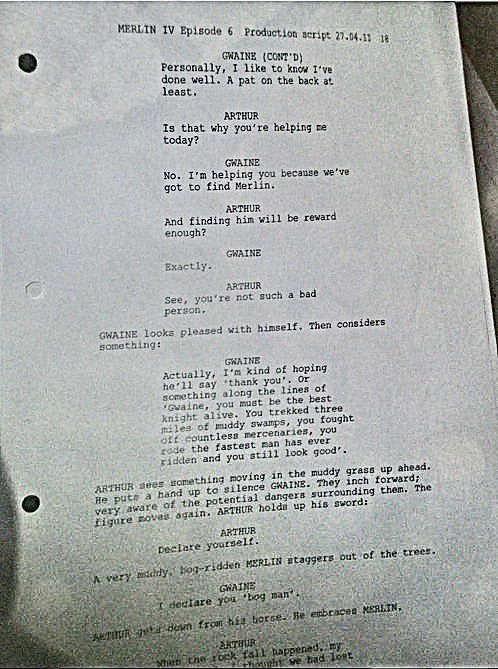
(Find the transcription here.)
I think it speaks for itself here, but, “And finding him will be reward enough?” truly captures the selfless devotion that Gwaine feels for Merlin.
Fandom generally accepts the idea that Gwaine would do anything for Merlin, but that Merlin never seems to do the same in return. However, this is likely a misconception of what counts towards a returned favor. Merlin is a physician, not a warrior. Or, as Morgana puts it, “a lover” (not a fighter). We cannot expect Merlin to help Gwaine in the same area of expertise that Gwaine helps him in. He applies himself in other ways.
When they meet in 3x04, Gwaine offers Merlin and Arthur aid in a tavern brawl where they’re clearly outnumbered. Gwaine is injured when his opponent pulls out a knife in a fistfight, and Merlin rushes to tend to his wound. Already, a favor is given and returned between the two.
And, while Gwaine does intend to help both Merlin and Arthur, not to mention the tavern employees, he takes a special interest in Merlin. Merlin is the only one who Gwaine takes the time to introduce himself to mid-fight, even as Merlin shouts for him to watch out as he is being actively attacked. And then, of course, Gwaine does fall to an attack. Merlin treats his injuries both on the spot and back in his own chambers.
One could argue that the introduction of Gwaine to Eira follows a similar format, with Gwaine coming to her rescue, only for her to save him when their attacker knocks him to the ground. Perhaps Gwaine even takes on Merlin’s role as caretaker from 3x04 when he brings Merlin in to treat Eira in 5x12, as opposed to receiving the treatment himself. Then again, it might be more similar to the scene in 4x07 where Gwaine jumps in to battle against Alator’s guard. Like Eira, Merlin also rescues Gwaine when he’s knocked to the ground (though Gwaine doesn’t know it).
As we can see, though, Merlin is not lying when he tells Gwaine, “I’d do the same for you,” in 3x08, nor when he tells Gwaine, “One day I’ll repay the favor,” in the deleted scene from 4x07. Merlin and Gwaine have different services to offer, but they offer to help all the same.
The next portion of the aforementioned 5x12 scene on our to-dissect list is the actual subject matter of the conversation, followed by a visual representation of the very same act.
After Gwaine thanks Merlin for helping Eira, Merlin mentions that Gwaine “seem[s] to care for her.” Gwaine, in an effort to avoid the sexual and romantic implications, diverts to the chivalrous explanation: “I could hardly leave her to the Saxons, now, could I?” Merlin teases him with no relent, though, and asks, “Was that your only reason for rescuing her?” Gwaine responds with a curt, “Of course.”
The subtext of this conversation is that Gwaine’s hurried involvement to protect/take care of Eira stems from a crush on her. This is true, as there were many enemies around, but Gwaine chose the one attacking the pretty “damsel in distress” to fight. He then takes one long look at her and decides to forgo the battle to take her to safety.
Merlin can’t help but notice Gwaine’s feelings for her. She is, after all, staying in his bed even after her wound has been treated, so there is a connection between them… much like Gwaine stayed with Merlin for the remainder of 3x04 until he had no choice but to fulfill the demands of his banishment. This is especially interesting, since the wound that Merlin treats Eira for is on her leg, which is the same spot where Gwaine was stabbed when they first met. Merlin similarly wrapped his wound at the time.
But the main point is the fact that Gwaine rescued Eira from the Saxons with a single-minded fervency, in part because he was attracted to her, and then quickly grew attached.
Gwaine then proceeds to rescue Merlin from Saxons a matter of seconds after this is established.
Allow me to remind you of Gwaine’s sudden change of course in saving Eira.
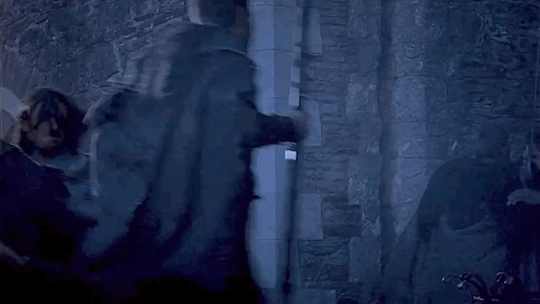
Now compare this to his rescue of Merlin.
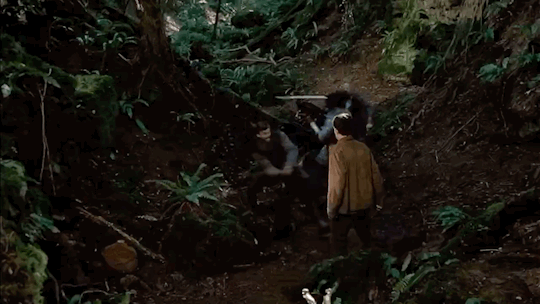
Let’s take a closer look at their dialogue:
Merlin: You seem to care for her.
Gwaine: I could hardly leave her for the Saxons, now, could I?
Merlin: [teasing] Was that your only reason for rescuing her?
Gwaine: [lying] Of course.
When applied to Gwaine’s rescue of Merlin, the conversation about Gwaine rescuing Eira takes on a more powerful meaning. After all, Eira is a virtual stranger who ends up being the traitor in the court. Gwaine sends her to her execution on Merlin’s word (via Gaius as the messenger), whereas Merlin is someone Gwaine has known for nearly a decade. There is a consistent history of Gwaine acting as Merlin’s body guard, which is being enacted again now as Gwaine escorts Merlin through the Valley of the Fallen Kings.
This is also one of the last ever scenes between Merlin and Gwaine. In truth, we are being shown a brief summary of their relationship as it comes to its narrative end—one last hurrah, if you will. And what they choose to show us is Gwaine protecting Merlin in an act of unconditional love.
Eira, like any character, is a plot device. Her interference leads to Merlin being trapped in the Crystal Cave, and Gwaine being tortured for information on Merlin and Arthur’s location. However, her presence as a person Gwaine wants to protect is meant to evoke the memory of every time Gwaine has protected Merlin. The chosen method to imply this was by creating a parallel between Gwaine’s protectiveness over the woman he’s currently sleeping with to his protectiveness over Merlin. Take that as you will.
#bbc merlin#merlin emrys#sir gwaine#merwaine#mergwaine#merlin meta#my meta#merlin and gwaine#bbc merlin deleted scenes#video#audio#transcript#long post is long
150 notes
·
View notes